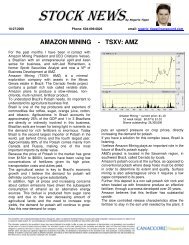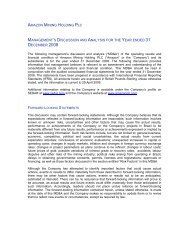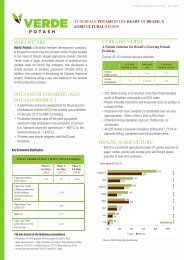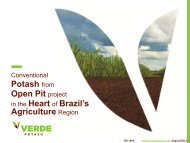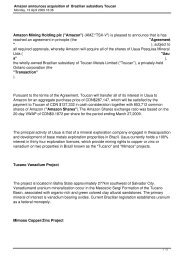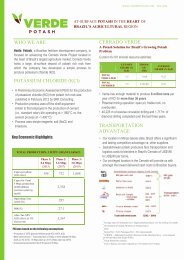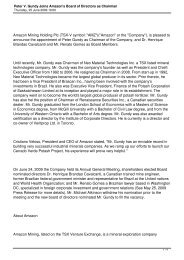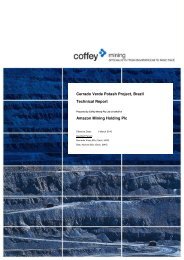Verde Potash heats up on Brazilian thermopotash - Ahead of the Herd
Verde Potash heats up on Brazilian thermopotash - Ahead of the Herd
Verde Potash heats up on Brazilian thermopotash - Ahead of the Herd
You also want an ePaper? Increase the reach of your titles
YUMPU automatically turns print PDFs into web optimized ePapers that Google loves.
AUTHORIZEDREPRINTwww.nor<strong>the</strong>rnminer.comAugust 1-7, 2011 • VOL. 97, NO. 24 • SINCE 1915more market development.”The company needed to develop a marketbecause, while this plentiful resourcehas been known since <strong>the</strong> 1960s, no <strong>on</strong>ehas actually managed to sell any <strong>of</strong> it.But <str<strong>on</strong>g>Verde</str<strong>on</strong>g> hopes to change that bytransforming <strong>the</strong> o<strong>the</strong>rwise useless glauc<strong>on</strong>ite-basedrocks into potentiallyvaluable “Thermopotash.” Decades ago,Vale (vale-n) looked into <strong>the</strong> potassium-richrocks at Cerrado <str<strong>on</strong>g>Verde</str<strong>on</strong>g> as apotential source <strong>of</strong> fertilizer, and found itcould create a potash alternative by cooking<strong>the</strong> rocks at high temperatures, andadding limest<strong>on</strong>e. In this way, Thermopotashwas born.The product has a lower potassiumoxide grade than more c<strong>on</strong>venti<strong>on</strong>al potash,but it is alsolow-chlorine, requiresfarmers use less limest<strong>on</strong>e <strong>on</strong> <strong>the</strong>ir fields,and its low solubility means <strong>the</strong> nutrientsare released slowly and not washedaway by Brazil’s heavy rains.But <strong>the</strong> cost <strong>of</strong> roasting <strong>the</strong> verdete over1,000°C was high, and local demand wasrelatively low, so Vale aband<strong>on</strong>ed <strong>the</strong>project and let <strong>the</strong> claims lapse.The situati<strong>on</strong>s in Brazil and <strong>the</strong> potashmarket have since changed dramatically.The agricultural sector has exploded, andfertilizer prices have followed suit. And<strong>the</strong>re, in <strong>the</strong> middle <strong>of</strong> this boom, sits<str<strong>on</strong>g>Verde</str<strong>on</strong>g> <str<strong>on</strong>g>Potash</str<strong>on</strong>g> and its sizable resource,waiting to reap <strong>the</strong> benefits <strong>of</strong> a welltimedland play.A PEA and market studies c<strong>on</strong>firm that<str<strong>on</strong>g>Verde</str<strong>on</strong>g> could make a respectable pr<strong>of</strong>itfrom Thermopotash. A sec<strong>on</strong>d technologicalbreakthrough — currently in <strong>the</strong>works, and patent-pending — couldradically change <strong>the</strong> company’s fortunes.Humble beginnings<str<strong>on</strong>g>Verde</str<strong>on</strong>g> <str<strong>on</strong>g>Potash</str<strong>on</strong>g>, which recently changed itsname from Amaz<strong>on</strong> Mining, did not beginas a potash company.When Veloso started <strong>the</strong> company in2005, he was intent <strong>on</strong> finding far morealluring gold. A native <strong>of</strong> Brazil’s miningcapital Belo Horiz<strong>on</strong>te, he was familiarwith <strong>the</strong> country’s <strong>on</strong>e-time status as <strong>the</strong>world’s largest exporter <strong>of</strong> gold (albeit in<strong>the</strong> 18th century), and wanted to make<strong>the</strong> most <strong>of</strong> his local experience to advanceprojects.His experiences as a 24-year-old,however, were somewhat limited. Butfresh from completing an advanced degreein internati<strong>on</strong>al business law, followingtwo earlier degrees, Veloso ga<strong>the</strong>redseed capital for <strong>the</strong> private venture, andwas ready to spread his entrepreneurialroots.“I’ve always been a bit <strong>of</strong> an entrepreneur,”Veloso says, recounting how heended <str<strong>on</strong>g>up</str<strong>on</strong>g> running a mining company atan age when most are trying to get hiredby <strong>on</strong>e. “Mining was a part <strong>of</strong> my lifegrowing <str<strong>on</strong>g>up</str<strong>on</strong>g>, and it just came as naturalwhen I started.”The company found limited successwith early properties, but debuted <strong>on</strong> <strong>the</strong>TSX Venture Exchange with a $16-milli<strong>on</strong>initial public <strong>of</strong>fering at $1.20 in late2007. A year later, <strong>the</strong> company tradedat barely 20¢, and change was afoot.Lured by a steep increase in potashprices, which in Brazil peaked at aroundUS$1,000 a t<strong>on</strong>ne in 2008, Veloso led<strong>the</strong> company out <strong>of</strong> gold and into potash.He encountered str<strong>on</strong>g resistance, butwith <strong>the</strong> company having already aband<strong>on</strong>edthree gold projects in 2008, Velos<strong>of</strong>ought for <strong>the</strong> change in directi<strong>on</strong>,and w<strong>on</strong>. So <strong>the</strong> team got to work.“When potash prices started going <str<strong>on</strong>g>up</str<strong>on</strong>g>,”Veloso says, “we sat down with our explorati<strong>on</strong>team, and we carefully lookedat every single opportunity <strong>on</strong> potash inBrazil.”Veloso said <strong>the</strong> team found envir<strong>on</strong>mentaland social problems with <strong>the</strong> obviouspotash prospects in <strong>the</strong> Amaz<strong>on</strong>Basin, and obstacles for properties surroundingVale’s Taquari-Vassourasmine in Sergipe state, <strong>the</strong> <strong>on</strong>ly active potassiummine in Brazil.The most interesting project turnedout to be a potassium silicate propertythat Ysao Munemassa, <str<strong>on</strong>g>Verde</str<strong>on</strong>g>’s currentexplorati<strong>on</strong> manager, had worked <strong>on</strong>with Vale l<strong>on</strong>g ago. Munemassa pointed<str<strong>on</strong>g>Verde</str<strong>on</strong>g> to <strong>the</strong> property’s still unrealizedpotential, and helped identify <strong>the</strong> bestground. In return, he got a 3% royalty <strong>on</strong><strong>the</strong> property, which <str<strong>on</strong>g>Verde</str<strong>on</strong>g> can buy for$3 milli<strong>on</strong> at any time.<str<strong>on</strong>g>Verde</str<strong>on</strong>g> went <strong>on</strong> a staking rush to secureas much choice land as possible, evenclaiming some areas as diam<strong>on</strong>d andphosphate licenses to avoid suspici<strong>on</strong>.The efforts proved wise. Vale swoopedin shortly after, and staked a large landpackage adjacent to <str<strong>on</strong>g>Verde</str<strong>on</strong>g>.On Nov. 24, 2008, <str<strong>on</strong>g>Verde</str<strong>on</strong>g> announced ithad amassed a 1,650-sq.-km land packagethat represented a “major <strong>Brazilian</strong> potashopportunity,” and a new directi<strong>on</strong> for<strong>the</strong> company. Shortly after, <strong>the</strong> company’sshare price hit an all-time low <strong>of</strong> 7¢.Out <strong>of</strong> NecessityThe next year was <strong>on</strong>e <strong>of</strong> patience.<str<strong>on</strong>g>Verde</str<strong>on</strong>g> worked to prove <str<strong>on</strong>g>up</str<strong>on</strong>g> a resource, andprove to investors that verdete slate —and <strong>the</strong> Thermopotash made from it —were indeed worthwhile commodities.The company amassed a who’s who <strong>of</strong>research and development partners. The<strong>Brazilian</strong> government-sp<strong>on</strong>sored Centrefor Mineral Technology signed <strong>on</strong>, as did<strong>the</strong> research program Agrominerais. Embrapa,Brazil’s main agricultural researchcorporati<strong>on</strong>, <strong>the</strong> University <strong>of</strong>Uberlandia, and <strong>the</strong> University <strong>of</strong> Lavraswould also all eventually research <strong>the</strong>practicability <strong>of</strong> Thermopotash.The government <strong>of</strong> Minas Gerais,meanwhile, fully endorsed <strong>the</strong> idea, andpromised preferential tax treatment,s<str<strong>on</strong>g>up</str<strong>on</strong>g>port in financing <strong>the</strong> project and helpwith <strong>the</strong> approval process.Later in 2009, ArcelorMittal (mt-n)signed <str<strong>on</strong>g>up</str<strong>on</strong>g> to test Thermopotash, as wouldAgrifirma Brazil, a UK-based agriculturefirm, while Sekita Agr<strong>on</strong>egocios, a leading<strong>Brazilian</strong> agribusiness, signed <strong>on</strong> in2



